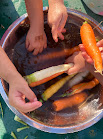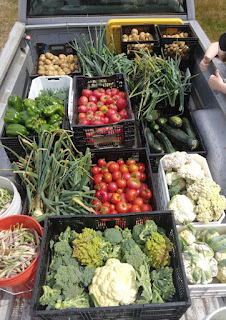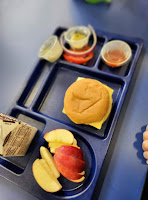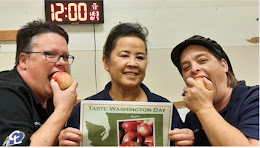 |
Sedro-Woolley School District served yogurt parfaits with Grace Harbor Farms vanilla yogurt, Viva Farms blueberries, and homemade granola at breakfast. |
More than 40 schools and childcare centers participated in Taste Washington Day earlier this month, sourcing Washington-grown foods from greater than 50 farmers and food producers. Throughout October, schools and childcare centers featured seasonal foods in school meals, highlighted partnerships with local growers, celebrated the harvest from school gardens and farms, and educated students on the richness of Washington agriculture and local food systems.
2022 Taste Washington Day highlights:
 |
| Quilcene school garden. |
WDSA staff celebrated with a visit to Quilcene School District to spotlight their fantastic farm to school connections. School lunch, served by high school culinary program students, included a local beef stew featuring meat and vegetables from nearby Short’s Farm, Midori Farm, Graysmarsh Farm, and Dharma Ridge Farm. The youngest students experienced the harvest season by crunching apples in the school garden.
Dieringer School District served Baked Cinnamon-Spiced Apples with Raisins and proudly serves Washington-grown applies, carrots, and strawberries.
Bellingham Public Schools served a local Two-Ton Tomato Sauce over whole grain penne pasta. With support from the WSDA Farm to School Purchasing Grant, the school district purchased tomatoes from Common Threads Farm, The Crows Farm, Cedarville Farm, Cooperativa Tierra y Libertad, and Hedlin Family Farms, sourced through the Puget Sound Food Hub.
The Children’s Center at Burke Gilman Gardens celebrated Taste Washington Day with Spooky Squash Bake Kits, a great way to engage the whole family in celebrating and tasting local foods.
 |
| Spooky Squash Bake Kits. |
 |
| Charlotte Green and Roland Dagdagan sorting fruit in Ellensburg. |
Sedro-Woolley School District offered organic Honeycrisp apples from Sauk Farm and served yogurt parfaits with Grace Harbor Farms vanilla yogurt, Viva Farms blueberries, and homemade granola at breakfast.
Melissa Holmes from Pe Ell School District cannot say enough about her staff.
 |
| Pe Ell’s Administration staff served the local fruit. Kyle
MacDonald/Superintendent, Brandon Pontius/K-8 Principal and Keith Shepherd/HS Dean of Students/AD. |
 |
| Carrots at WallaWalla daycare. |
Children at the Little Angels Biodome Daycare and Pre-school in Walla Walla harvest and wash carrots from the garden. Little Angels Biodome also partners with Hayshaker Farm to source local foods for the center’s meals.
The Olympia School District’s Child Nutrition Services Department featured foods from area farms and ranches, including their very own Olympia High School Freedom Farm.
The Olympia High School Freedom Farmers is an alternative, experiential block-class program for
 |
Olympia High School freedom farmer students were busy harvesting and preparing crops in preparation for the big day. |
Taste Washington Day meals featured items ranging from chili made with grass fed beef, muffin bread made from zucchini, salad bar items including carrots, celery, and cantaloupe, and crisps made from blackberries and blueberries.
 |
| Washington-grown foods on the lunch trays at Pe Ell School District is a regular occurrence. |
Thank you to all the schools, farms, and community partners who celebrated Taste Washington Day and National Farm to School Month this year! Farm to school connections continue throughout the year in Washington, follow or tag #wafarmtoschool on your preferred social media platform to find out or share what’s happening.
Want to connect with others involved in farm to school or early learning? Join the Washington State Farm to School Network! Learn more and sign up at www.wafarmtoschoolnetwork.org
 |
| Chief Leschi Schools celebrates the Washington Apple Crunch with apples from Sterino Farms. |
For more information about WSDA’s Farm to School Program, visit www.agr.wa.gov/farmtoschool or contact Annette Slonim, Farm to School Lead, at 206-714-2757 (calls/texts welcome) or aslonim@agr.wa.gov.
More photos from Taste Washington Day 2022
 |
| Students in Yakima enjoyed roasted rosemary fingerling potatoes and Sweetie apples. |
 |
| Organic Honeycrisp apples from Sauk Farm. |
 |
| Bellingham Public Schools served a local Two-Ton Tomato Sauce over whole grain penne pasta. |






